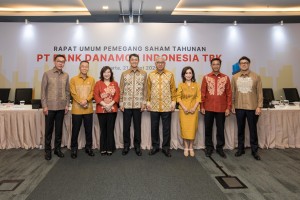Danamon, MUFG to invest US$ 100 million in Garuda Fund
PT Bank Danamon Indonesia Tbk and MUFG Bank announced a placement of US$ 100 million in a Venture Fund focusing on Indonesia called the MUFG Innovation Garuda No. 1 Limited Investment Partnership, or Garuda Fund.
Established in 1956, Danamon provides financial products and services, including personal and corporate banking, loans, credit cards and investment banking. As of 2021, Bank Danamon was one of the country's largest banks by assets and had a significant presence across the country, with over 1,000 branches and sub-branches.
Mitsubishi UFJ Financial Group, Inc. (MUFG), which was founded in 2005, is a Japan-based large financial holding company. The MUFG was a result of a merger of Mitsubishi Tokyo Financial Group and UFJ Holdings. The company offers a range of businesses including retail banking, corporate banking, trust banking, securities and investment banking.
Investment in fintech startups
The Garuda Fund aims to strategically invest in fintech startups with digital scale and capabilities to support their growth and expand Danamon's collaboration ecosystem. The formation of Garuda Fund highlights the importance of Indonesia as the largest digital economy in ASEAN for the MUFG group.
“The Garuda Fund is intended to make strategic investments in Indonesia's dynamic and competitive digital financial sector. It emphasizes on investing in digital financial platform and financial technology (fintech) startups with qualified scale and digital capabilities. The fund is also to support the development of startup companies and expand collaboration in Danamon's ecosystems,” Danamon Chief Strategy Officer Reza Iskandar Sardjono said in company statement on January 31, 2023.
“MUFG aims to meet the financial needs of Indonesians, capitalize on the country's growth and contribute to financial inclusion. The Garuda Fund enables MUFG and Danamon to collaborate with Indonesian startups, to strengthen product offerings, secure access to a diverse customer base and drive digitization to better serve a wider spectrum of customers,” MUFG Managing Executive Officer and Chief Executive of Global Commercial Banking Business Unit Kenichi Yamato said.
MUFG Bank and Danamon are the limited partners in the Garuda Fund, with 89.9% and 10% shares, respectively. Meanwhile, the MUFG Innovation Partners Co. Ltd. (MUIP) has 0.1% shares.
Risks for fintech startups
Despite the growing number of fintech startups, they still face some risks, including:
- Business model risk: The business model may not be viable and may struggle to generate enough revenue to sustain itself.
- Market risk: The startup may operate in a highly competitive market and may struggle to gain traction and attract customers.
- Technology risk: The company may rely on new or untested technology that may fail or become outdated quickly, leading to lower performance and potential financial losses.
- Management risk: Fintech startup may be run by inexperienced or ineffective management, which could negatively impact its growth and success.
- Financial risk: They may struggle to secure sufficient funding to support its operations, leading to financial difficulties and a lower return on investment.
- Regulatory risk: The startup may be subject to new or changing regulations that could impact its operations and profitability.
Already have an account? Sign In
-
Start reading
Freemium
-
Monthly Subscription
30% OFF$26.03
$37.19/MonthCancel anytime
This offer is open to all new subscribers!
Subscribe now -
Yearly Subscription
33% OFF$228.13
$340.5/YearCancel anytime
This offer is open to all new subscribers!
Subscribe now






